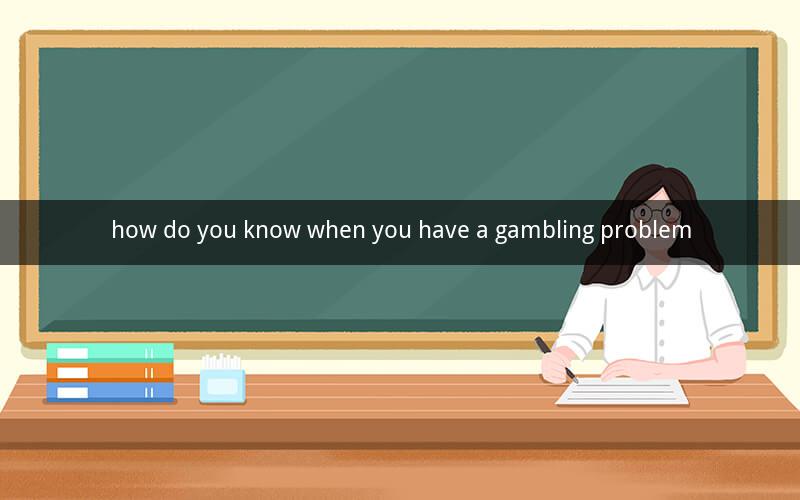
How Do You Know When You Have a Gambling Problem?
Table of Contents
1. Understanding the Concept of Gambling
2. Recognizing the Signs of a Gambling Problem
1.1 Financial Issues
1.2 Emotional and Psychological Effects
1.3 Social Consequences
1.4 Legal Implications
3. Seeking Help for a Gambling Problem
3.1 Finding Supportive Resources
3.2 Therapeutic Approaches
3.3 Self-Help Strategies
4. Preventing Future Gambling Problems
4.1 Building Financial Resilience
4.2 Developing Healthy Coping Mechanisms
4.3 Staying Informed About Responsible Gambling
1. Understanding the Concept of Gambling
Gambling is the act of betting or wagering something of value on an event with an uncertain outcome. It can be done through various forms, such as casino games, sports betting, lottery, poker, and online gambling. While many individuals engage in gambling without any issues, others may develop a gambling problem that can significantly impact their lives.
2. Recognizing the Signs of a Gambling Problem
2.1 Financial Issues
One of the most apparent signs of a gambling problem is financial strain. This may include:
- Excessive spending on gambling activities
- Borrowing money to fund gambling habits
- Missing payments or accumulating debt
- Selling possessions or assets to finance gambling
2.2 Emotional and Psychological Effects
Gambling problems can have a profound impact on one's emotional and psychological well-being. Some signs to look out for include:
- Feelings of guilt, anxiety, or depression
- Increased irritability or aggression
- Difficulty concentrating or making decisions
- Denial or minimizing the extent of the problem
2.3 Social Consequences
Gambling problems can disrupt social relationships and cause isolation. Some signs to be aware of include:
- Withdrawal from family and friends
- Missing social events or obligations
- Decreased interest in hobbies or activities
- Arguments or conflicts with loved ones due to gambling
2.4 Legal Implications
In some cases, gambling problems can lead to legal issues, such as:
- Engaging in illegal gambling activities
- Fraud or theft to finance gambling
- Failing to meet legal obligations due to gambling debts
3. Seeking Help for a Gambling Problem
3.1 Finding Supportive Resources
If you suspect you or someone you know has a gambling problem, it is crucial to seek help. Some resources to consider include:
- Gamblers Anonymous: A support group for individuals with gambling problems
- National Council on Problem Gambling: Provides resources and helplines for those struggling with gambling
- Therapy and counseling services: Professional help for addressing the underlying issues associated with gambling
3.2 Therapeutic Approaches
Several therapeutic approaches can be effective in treating gambling problems, including:
- Cognitive-behavioral therapy (CBT): Helps identify and change negative thought patterns and behaviors
- Family therapy: Assists in repairing relationships and addressing family dynamics
- Support groups: Provides a sense of community and shared experiences
3.3 Self-Help Strategies
Self-help strategies can also be beneficial in managing a gambling problem. Some examples include:
- Setting limits on gambling activities and time spent on gambling
- Avoiding triggers or high-risk situations
- Developing healthy coping mechanisms, such as exercise, hobbies, or meditation
4. Preventing Future Gambling Problems
4.1 Building Financial Resilience
To prevent future gambling problems, it is essential to build financial resilience. This can include:
- Creating a budget and sticking to it
- Saving money for emergencies
- Learning about responsible financial management
4.2 Developing Healthy Coping Mechanisms
Developing healthy coping mechanisms can help reduce the likelihood of relapse. Some strategies include:
- Engaging in regular physical activity
- Practicing mindfulness or meditation
- Seeking support from friends, family, or professionals
4.3 Staying Informed About Responsible Gambling
Staying informed about responsible gambling can help prevent problems from arising. Some resources to consider include:
- Educational materials on responsible gambling
- Websites and blogs that promote responsible gambling
- Regularly reviewing your gambling habits and seeking feedback from others
FAQs and Answers
1. What is a gambling problem?
- A gambling problem is the inability to control or stop gambling, which can lead to negative consequences in various aspects of life, such as financial, emotional, social, and legal.
2. Can gambling addiction be cured?
- While there is no guaranteed cure for gambling addiction, it can be effectively managed through therapy, support groups, and self-help strategies.
3. How common is gambling addiction?
- The prevalence of gambling addiction varies by region and demographic, but it is estimated that around 2-3% of the population may have a gambling disorder.
4. What causes gambling addiction?
- Several factors can contribute to the development of a gambling addiction, including genetic predisposition, mental health issues, and environmental influences.
5. Can children develop a gambling problem?
- Yes, children can develop a gambling problem, although it is less common than in adults. Early exposure to gambling and peer pressure can increase the risk.
6. How can I tell if I have a gambling problem?
- Signs of a gambling problem include financial strain, emotional and psychological issues, social consequences, and legal implications.
7. Is online gambling more addictive than traditional gambling?
- Online gambling can be more addictive due to its convenience, accessibility, and fast-paced nature. This can make it easier for individuals to engage in excessive gambling activities.
8. How can I help a loved one with a gambling problem?
- Encourage your loved one to seek help, offer support, and be patient. You can also educate yourself about gambling problems and learn about available resources.
9. Can therapy help someone with a gambling problem?
- Yes, therapy can be highly effective in treating gambling problems. Cognitive-behavioral therapy, family therapy, and support groups are commonly used approaches.
10. How can I prevent gambling problems?
- To prevent gambling problems, it is essential to set limits on gambling activities, develop healthy coping mechanisms, and stay informed about responsible gambling.